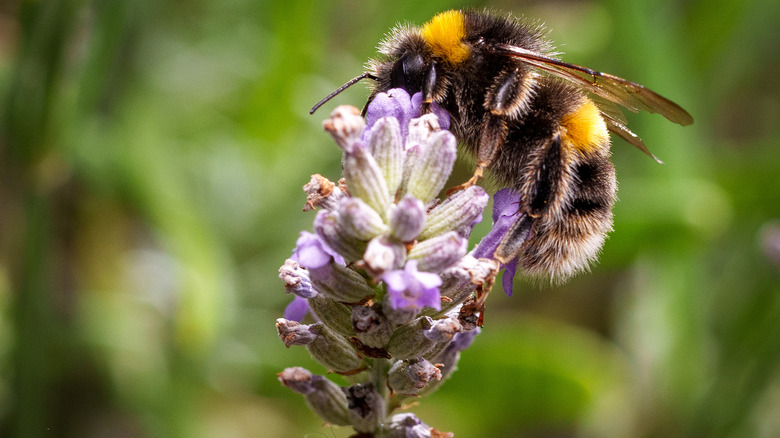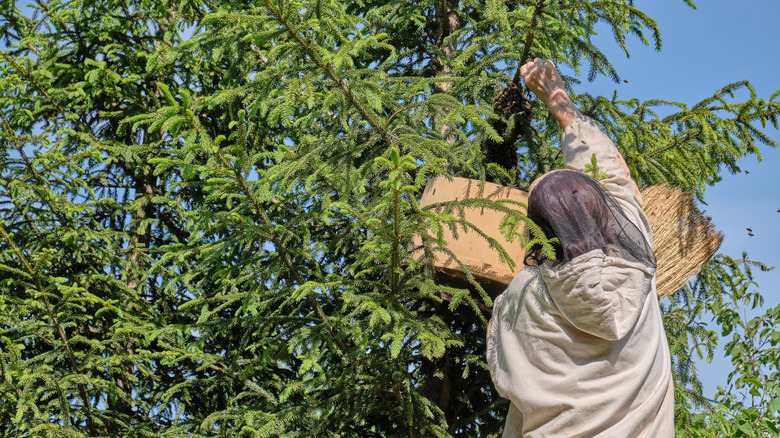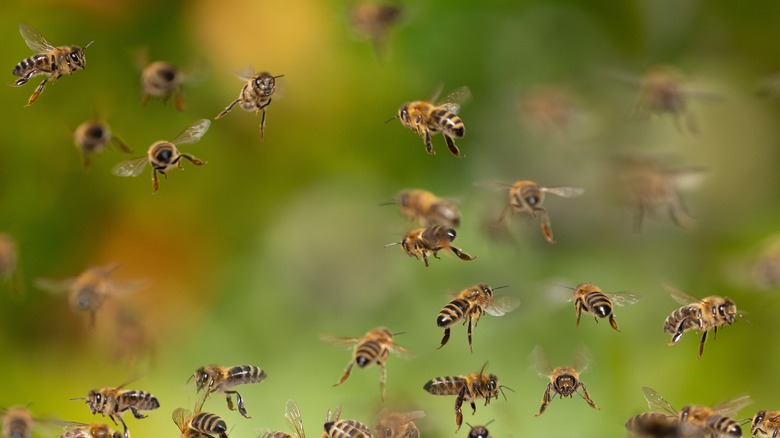How To Extract Bees From Your Home Without Harming Them, Per Experts
Bees play an essential role in the cycle of life. They are helpful pollinators that ensure fertilization and plant growth, per Friends of the Earth. They also produce an ingredient that has a myriad of uses — honey. Did you know that eating honey every day has numerous benefits for your body?
Regardless of their many valuable attributes, there is no need for you to live in close proximity to them — especially if there's a good chance you're going to get stung. Getting rid of bees from and around your home is not as complicated as it might sound, according to Real Homes. There are safe and humane ways to do so.
If you suspect a colony of bees in your home or close to where you live, it is important to stay calm and to make sure children, pets, and anyone allergic to bee stings is kept away (via Terminix). Now let's move on to the steps involved in removing the bees safely, according to experts.
Determine the location of the bees and try these methods to remove them
Finding out where the bees are nesting is the first step, per Real Homes. Pest expert Jordan Foster explains that bees usually move around most during the day and that it is unwise to try and move a hive if you do find one. "Bees will swarm out to protect it and everybody around is getting stung," he shares. The bees could be inside your home walls, in the ground, or in a tree (via Solutions Pest & Lawn). Understanding what kind of bees you're attempting to safely remove can be helpful too, according to Bob Vila.
You can try smoking out the bees once you've found their location, reports Real Homes. The smoke usually signals a forest fire to the bees, according to entomologist Nicolas Martin, and one way you can do this is by creating a "small smokey fire with dead firewood." Martin cautions about standing close to the hive while you smoke them out.
Vinegar is another easy and natural way to get rid of bees. Foster, speaking to Real Homes, explains that you could try spraying around the hive with this environmentally-friendly household product. Another natural method to try is sprinkling some cinnamon around the hive. Additionally, garlic and water-based solutions have been proven successful, according to World Birds, as has placing a citronella candle close to the hive.
How to prevent bees from nesting on your property
Filling up any old rodent tunnels on your property is a good place to start when it comes to preventing bees from nesting, according to entomologist and beekeeper Marc Potzler; maintaining a clean yard also helps, per Real Homes. "Anywhere there is sugar or protein will attract these stinging insects, such as hummingbird feeders and the grease from your grill," Potzler said. So, keep your surroundings clear of food sources for the bees.
When it comes to bees that burrow in the ground, a good way to keep them off is to water your garden frequently, according to World Birds. Bees are attracted to nest in dry, parched ground so regular hydration will keep them at bay. Certain smells like mothballs and repellent plants act as deterrents to bees, explained pest expert Jordan Foster when speaking to Real Homes. While there are certain plants that will help bring bees to your garden, there are others that work to keep them away. Foster recommends low-maintenance plants like eucalyptus, mint, and citronella. "Bee repellents such as marigold and germanium can be a very effective way to keep them at bay," Foster noted.
Despite these efforts, if it's proving challenging to safely remove the bees — especially if their location is hard to get to — call upon the professionals.


